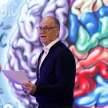Lipstick & Meaning
If you strip everthing away from a human being, what is left? Find out how hope and humanity will always sustain us.

Wednesday this week was Holocaust remembrance day, which prompted me to revisit Victor Frankl’s book “Man’s search for meaning”. The book is filled with hope and optimism that was borne out of one of humanities lowest and darkest moments.
Frankl was a survivor of the Nazi concentration camps and went on to become a professor of Neurology and Psychiatry at the University of Vienna Medical School. He developed a simple and effective concept that he called Logotherapy, a system of existential therapy focused on finding personal meaning for Life. An approach that encourages looking forward rather than looking backwards and taking control of your attitude towards your life. Its simplicity is it’s strength.
If there was one book I would recommend everyone to read in their youth and again in middle and old age, this is it. To be able to find or create meaning is purpose and the key to living a fulfilled and gracious life. Frankl's insights into freedom, dignity, compassion and the search for meaning are deeply humanizing and has the power to transform lives. His view is that we hold the key to our own transformation. Human contact and the ability to have hope and see a future, no matter how small, gives meaning to a life.
Frankl asked himself a simple question; What remains if you strip everything away from someone, what is left?

Yad Veshem, Jerusalem
During his time in the concentration camps, he saw how almost everything physical and emotional was stripped from the prisoners, and yet in spite of this, some people managed to find dignity, humanity, and meaning in their existence.
At first arrival in the camps, most people would fabricate, sometimes elaborate stories to avoid despair and not have to come to terms with the realty of their situation. They would tell themselves that it would be different for them. To convince themselves, that they would be OK. If they were separated into a different line, it was because they were able to work or were being sectioned off for some “other” tasks. They would build stories to protect themselves, so that they wouldn’t sink into depression.
After a while though, as people got used to the atrocity around them and the misery of their existence and slumped into apathy. Prisoners would numb their senses and their perception. They would concentrate only their survival. Many lost the belief that life could have any meaning or purpose. When you rob someone of their ability to see any future and give them just moment-to-moment existence, and no control whatsoever, all hope is lost and they shield themselves for thinking and engaging. Their only hope was in being able to control their thoughts, their memories and their endurance.

Bronze Commemoration plaques, Berlin
When the Camps were finally liberated in 1945, many of the prisoners understandably took a long time to re-adjust to normal life. Most of their homes and families had been extinguished and disbelief gradually gave way to bitterness. Normal life was difficult and they often found it hard to express joy. They had hoped for compassion but found none and as a result, many focused on their inner lives.
Whilst in the camps many used memory to help them to survive. Using imagined conversations with their families and the memory of love and warmth. Many tried to make decisions about their own existence, although very small, to get a sense that they were still in control of some part of their lives. Many tried to maintain their moral standards and compassion to give themselves a sense of purpose and meaning and that some things mattered. Some values were sacred that no one could touch. Trying to focus on a future so that there was something to wish for and aspire to.
There is an astonishing account from the diary of Lieutenant Colonel Mervin Willet Gonin DSO from the 23rd May 1945, who was one of the first to liberate a Nazi concentration camp;
“It took a little time to get used to seeing men, women, and children collapse as you walked by them…one had to get used early to the idea that the individuals just didn’t count… It was shortly after the British Red Cross arrived, though it may have no connection, that a very large quantity of lipstick arrived. This was not at all what we men wanted, we were screaming for hundreds and thousands of other things and I don’t know who asked for lipstick. I wish so much that I could discover who did it, it was the action of a genius, sheer unadulterated brilliance. I believe that nothing did more for those internees than the lipstick. Women lay in bed with no sheets and no nighty but with scarlet red lips, you saw them wandering about with nothing but a blanket over their shoulders, but with scarlet red lips. I saw a woman dead on the post mortem table and clutched in her hand was a piece of lipstick. At least someone had done something to make them individuals again, they were someone, no longer merely a number tattooed on the arm. At least they could take an interest in their appearance. That lipstick started to give them back their humanity”.
Frankl goes on to say that without meaning and purpose, we exist in an existential vacuum. Our motivation to act stems from our lives meaning. People need to find or create meaning to have something to look forward to. Finding meaning, according to Frankl is the primary motivational force in man. People often live and even die for the sake of their ideals. Man needs something for the sake of which to live.

Yad Vashem, Jerusalem
Modern thinking suggests that we ought to be happy and that unhappiness is a symptom of maladjustment. But Frankl suggests that we shouldn’t avoid pain or simply gain pleasure, but rather see meaning [or create meaning] in the life we lead. Even suffering should have meaning.
Meaning doesn’t have to be grand, there is no “general” absolute meaning. We have to find and create our own specific meanings. It is how we act and the responsibility towards our choices that determines our meaning.
There must be tension between what one is and what one should become. Striving and struggling for a worthwhile goal and freely chosen task. You can manage fear by actively pursuing them by focusing on the internal, our attitude, rather than the external. You may not be able to change events, but you can change your attitude toward them.
Earl Nightinggale in his essay, “the Stragest Secret” also says:
“Success is the progessive realization of a worthy Goal…It is the person who says, “I am going to become this”, and then begins to work towards that goal...
A success is anyone who is pursuing deliberately a predetermined goal, because that’s what he or she has decided to do…deliberately”
Nightingale believes that you fail when you believe that your life is shaped by circumstance, by the things that happen to you, by exterior forces. If you have no goal (no matter how small) you cannot push towards that destination and thereby give meaning and purpose to your journey.
The rules for success, meaning and purpose are the same for success and failure,
“We become what we think about”
“If all life moves inevitably towards its end, then we must, during our own, colour it with our colours of love and hope”
Marc Chagall

Chagall Windows
www.charlesleon.uk






Comments
There are no comments for this story
Be the first to respond and start the conversation.